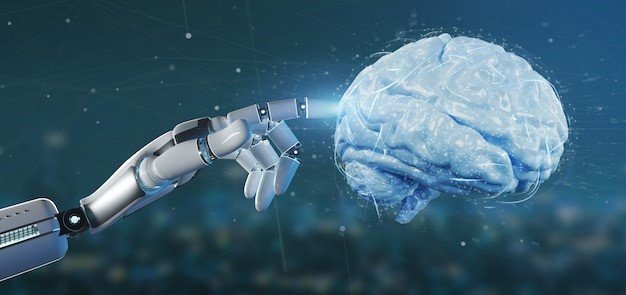Did you hear about the new artificial intelligence innovative industries that are booming nowadays such as ChatGPT and self-driving cars? Actually, the advancement in the branches of computer science is uprising year after year unpredictably. Artificial intelligence is one of such branches that is being applied nowadays in the operations of any industry. According to dataprot.net, the global AI market value is expected to reach $267 billion by 2027.
What is Artificial Intelligence?
It refers to improved computer systems that build intelligent machines performing all tasks that require human intelligence. These machine-enabled functionalities aim at replacing the human cognitive functions depending on a massive amount of data that they process when needed to make a decision or take an action.
The tasks done by such smart machines entail things that need using the human mind such as decision-making, perceiving visual elements, playing games, speech recognition, language translation, and many endless tasks.
Due to its time-saving and cost-effectiveness, companies find it worth investing in and start to apply many AI-based systems to perform different operations. As reported by Statista, AI is used increasingly to perform operations in the technology and telecommunication industry with 34 and 45 percent of respondents answering as such, respectively.
How AI is Beneficial in Our Everyday Life?
Using AI is helpful and effective in all industries to carry out different tasks fast and efficiently. The following are some of its benefits:
- AI supports the efforts of human labor through smart machines that facilitate their tasks and make them easier
- It is useful in risky situations. For example, it can be used in the banking sector for data securing and revenue generation
- It saves time and cost since intelligent machines do not stop working
- AI machines reduce the occurrence of errors and maintain consistency and precision
- They make unbiased decisions since human decisions are sometimes influenced by their emotions
Now, we will discuss the effect of AI on one of the most important industries in this globalized world which is translation.
How Does AI Affect Translation?
Translation builds bridges of communication among people from different countries. In this age where globalization is overwhelming everything, people are becoming more enthusiastic about contacting people from different parts of the world, knowing their cultures, and learning their languages. Hence, translation has become more important than ever.
The translation industry is impacted by many bleeding-edge technologies including artificial intelligence. The use of AI translation machines such as Amazon Translate and Google Translate is now dominant as people use them for different purposes.
AI machine translations work by using neural networks simulating the human brain to perceive source texts and translate them into other languages.
Although AI has many positive impacts on translation, negative impacts can be found too. Let’s dive into the pros and cons of AI translation machines.
Timely and Cost-effective Translation Services
Many businesses nowadays prefer using machine translations due to their lower cost and fastness. However, they still need to be checked by human translating as a post-editing process to ensure the accuracy of translations.
An Effective Aid for Tourists
When tourists visit new countries, they usually need a fast language guide to translate signs or policies. Thus, language applications help them get fast translations that may save their lives.
Reducing Human Workforce
Since the AI machine translation industry becomes more advanced over time, it threatens the future of human translators as the evolution of the AI industry is always unexpected. Until now, a human touch is always needed after getting machine-translated texts.
Recent research has revealed that AI will decrease opportunities and at the same time open new ones. However, we do not know what the future will bring to us.
AI Translation Machines Cannot Localize Texts
Although AI translation machines perform well at translating texts depending on a huge database, they cannot interpret texts with cultural meanings such as idioms, dialects, metaphors, or colloquialisms. Therefore, AI translation machines will produce inaccurate and confusing translations when it comes to localization.
Only human translators can understand the cultural nuances of texts and use their creativity to deliver the same idea of the source text to be culturally acceptable for target audiences.
A New Era for Language Learning
Indeed, AI paves the way for a new era of learning languages. AI language applications and software now make it much easier for people to learn new languages. Instead of spending too much money on language courses, you can just download the app and learn anytime and anywhere. This method saves both time and cost and encourages people to take the initiative and know about world languages.
Final Thoughts
AI becomes indispensable in many aspects of our everyday life. It has strong and positive effects on all industries and translation is no exception. Despite its few negative impacts, it helps the translation industry flourish in many ways.
Afrolingo is an accountable translation agency in South Africa as we offer timely and cost-effective translations that will help you penetrate new markets.


